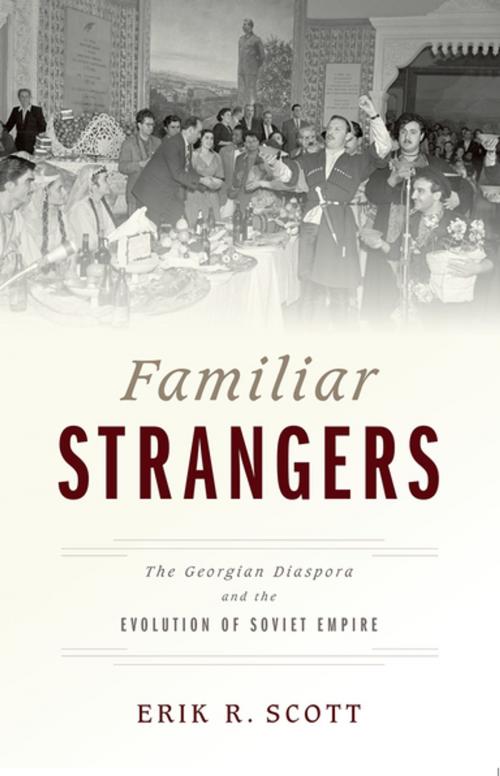Familiar Strangers
The Georgian Diaspora and the Evolution of Soviet Empire
Nonfiction, History, Asian, Russia, European General| Author: | Erik R. Scott | ISBN: | 9780199396399 |
| Publisher: | Oxford University Press | Publication: | March 15, 2016 |
| Imprint: | Oxford University Press | Language: | English |
| Author: | Erik R. Scott |
| ISBN: | 9780199396399 |
| Publisher: | Oxford University Press |
| Publication: | March 15, 2016 |
| Imprint: | Oxford University Press |
| Language: | English |
A small, non-Slavic nation located far from the Soviet capital, Georgia was more closely linked with the Ottoman and Persian empires than with Russia for most of its history. One of over one hundred officially classified Soviet nationalities, Georgians represented less than 2% of the Soviet population, yet they constituted an extraordinarily successful and powerful minority. Familiar Strangers aims to explain how Georgians gained widespread prominence in the Soviet Union, yet remained a distinctive national community. Through the history of a remarkably successful group of ethnic outsiders at the heart of Soviet empire, Erik R. Scott reinterprets the course of modern Russian and Soviet history. Scott contests the portrayal of the Soviet Union as a Russian-led empire composed of separate national republics and instead argues that it was an empire of diasporas, forged through the mixing of a diverse array of nationalities behind external Soviet borders. Internal diasporas from the Soviet republics migrated throughout the socialist empire, leaving their mark on its politics, culture, and economics. Arguably the most prominent diasporic group, Georgians were the revolutionaries who accompanied Stalin in his rise to power and helped build the socialist state; culinary specialists who contributed dishes and rituals that defined Soviet dining habits; cultural entrepreneurs who perfected a flamboyant repertoire that spoke for a multiethnic society on stage and screen; traders who thrived in the Soviet Union's burgeoning informal economy; and intellectuals who ultimately called into question the legitimacy of Soviet power. Looking at the rise and fall of the Soviet Union from a Georgian perspective, Familiar Strangers offers a new way of thinking about the experience of minorities in multiethnic states, with implications far beyond the imperial borders of Russia and Eurasia.
A small, non-Slavic nation located far from the Soviet capital, Georgia was more closely linked with the Ottoman and Persian empires than with Russia for most of its history. One of over one hundred officially classified Soviet nationalities, Georgians represented less than 2% of the Soviet population, yet they constituted an extraordinarily successful and powerful minority. Familiar Strangers aims to explain how Georgians gained widespread prominence in the Soviet Union, yet remained a distinctive national community. Through the history of a remarkably successful group of ethnic outsiders at the heart of Soviet empire, Erik R. Scott reinterprets the course of modern Russian and Soviet history. Scott contests the portrayal of the Soviet Union as a Russian-led empire composed of separate national republics and instead argues that it was an empire of diasporas, forged through the mixing of a diverse array of nationalities behind external Soviet borders. Internal diasporas from the Soviet republics migrated throughout the socialist empire, leaving their mark on its politics, culture, and economics. Arguably the most prominent diasporic group, Georgians were the revolutionaries who accompanied Stalin in his rise to power and helped build the socialist state; culinary specialists who contributed dishes and rituals that defined Soviet dining habits; cultural entrepreneurs who perfected a flamboyant repertoire that spoke for a multiethnic society on stage and screen; traders who thrived in the Soviet Union's burgeoning informal economy; and intellectuals who ultimately called into question the legitimacy of Soviet power. Looking at the rise and fall of the Soviet Union from a Georgian perspective, Familiar Strangers offers a new way of thinking about the experience of minorities in multiethnic states, with implications far beyond the imperial borders of Russia and Eurasia.















